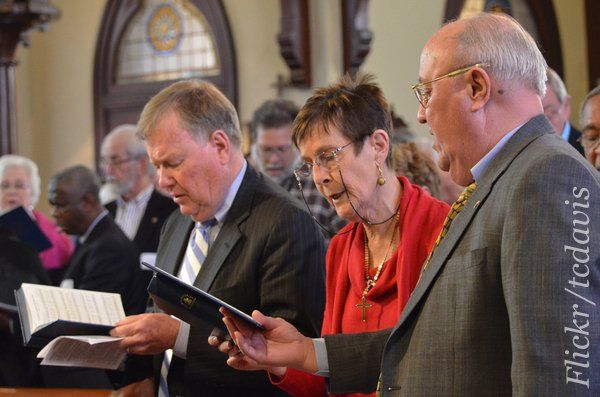
When we hear the complaint that some of our traditional hymns are ancient we reply that Jesus Christ lived, died, rose and achieved our redemption two thousand years ago, and since then the Holy Spirit has been indwelling and gifting every one of his people. It has not been merely in the last twenty years that hymnists have emerged in the church. ‘It seems odd,’ said Spurgeon, ‘that certain men who talk so much of what the Holy Spirit reveals to themselves should think so little of what he has revealed to others.’ We are content to learn of those since the time of Moses (Psalm 90) who have walked with God, whose hearts were ravished with love for the Son, who were mighty in the Scriptures. They wrote memorable hymns, and those whose lives have been exposed to their compositions since childhood have a sense of wonder that never leaves them, whenever such phrases come to their minds as, ‘God moves in a mysterious way, His wonders to perform’, ‘Prone to wander, Lord, I feel it, Prone to leave the God I love’, ‘Lord, it is my chief complaint That my love is cold and faint’, ‘Where is the blessedness I knew When first I saw the Lord?’, ‘Give His angels charge at last In the fire the tares to cast’, ‘Thou art the everlasting Word, The Father’s only Son, God manifestly seen and heard, And heaven’s beloved one’, and hundreds more.
Those phrases are hardly difficult to understand – they are certainly not obscure or impenetrable. What they have, however, is a trembling adoration, a resonance and vividness. They are not pedestrian or trite. They do not, in the manner of contemporary choruses and advertising jingles, put everything ‘up front’ and eliminate any element of subtlety. They are above all memorable. They have passed deep into the collective Christian consciousness, and still have the power to inspire – how often are they naturally quoted in prayer? They console and move to tears. They are like land-mines, hidden away and unnoticed for many years until a crisis comes – an illness or a time of great exultation – and their message of hope, comfort and courage is detonated.

‘God is our refuge’
One thinks of that incident recorded by Iain Murray in his Diary of Kenneth MacRae (p.324). It was the last Sunday in August 1939 in the town of Stornoway, the commercial capital of the western isles, and the shadow of war had been cast across the community. After the Sunday services were over all the naval reservists went quietly to the harbour to board the Lochness. Congregations and families accompanied them in total silence. The deck of the ship filled until there was no room for more men. The ship slipped its moorings. Parents looked at sons, wives at husbands, some of whom would never be seen again as the ship drifted slowly away from the quayside. Then the silence was broken by a precentor giving out the line of Psalm 46 in Gaelic to the tune ‘Stroudwater’, and the crowd on land and on the ship took up the praise:
God is our refuge and our strength,
in straits a present aid;
Therefore, although the earth remove,
we will not be afraid.
It is precisely that sense of awesome trust, so evidently present in the language of the great hymns, which is markedly absent in modern choruses. It is that rich heritage which is now at risk. An American music commentator called John Fishcher recently complained, ‘It’s hard for me these days to get into many churches where I can hear a hymn any more – because now everything is contemporary. It’s like we’ve left a lot of our history, because we’re wanting to make something really hip and cool that everybody’s going to be excited about. We do everything with a praise band and the words are up on the screen and we’re all singing repetitious choruses over and over again.

‘Sometimes I start longing for one of those great old Isaac Watts hymns with somebody’s grandmother playing the organ – even messing it up through all four verses. Somehow, something got through there as we worked over and stumbled through the words we couldn’t quite understand because they were from another generation and culture from ours. Yet they forced us to think about our faith, and realize that our faith is not just for now but one that is historical’ (World, 4 June 1994).
The decline of the hymn
One of the reasons for the denigration of the hymn is theological: the perspective of past hymns was a pervasive God-centredness. Our life, salvation, preservation, progress in grace and eternal destiny hang upon the mercy of God alone. When our fathers read in Scripture, ‘For of him, and through him, and to him are all things’ (Romans 11:36), they did not explain that away. They believed it and responded in doxology: ‘To whom be glory for ever. Amen.’ That reality sobers any Christian, that his every constituent part is in the hands of the living God. Revealed religion also teaches that our entire redemption is due to the work the Lord Christ accomplished upon Calvary, and that we can receive its benefits only by entrusting ourselves to him. One cannot jig to ‘See from his head, his hands his feet, sorrow and love flow mingled down.’ Calvary is painful yet. The God of the Bible is also seen to be one before whom the seraphim hide their eyes, and holy men fall, convicted of their sinfulness. Hymns reflecting that do not fit in with the philosophy of much pop religion.
Another reason hymns have been replaced by contemporary songs is because of the pressure of post modernist ideas in our society. Post-modernism denies that there are any standards of right and wrong, beauty and ugliness. Martha Bayles has recently written Hole in our soul: the loss of beauty and meaning in American popular music (The Free Press, 453 pages, $25). Its thesis is that the anarchist, nihilistic impulses of perverse modernism have been grafted onto popular music and have encouraged today’s cult of brutality and sonic abuse. Martha Bayles is no fundamentalist: she is a graduate of and teacher at Harvard University. She is a product of liberalism’s intellectual mainstream, yet she sees post-modernism as a movement which results in standards of excellence in many areas of life being attacked, and the present being severed from the best of the past. Post-modernism can point out the past’s imperfections, but it has replaced it by little more than the quick-fix experience.

Why do many serious young people feel ambivalence or confusion when confronted with contemporary Christian music? They would do well to connect their unease with an awareness of the ‘hole in the soul’ of much popular music. That music has lost beauty and meaning. Who can sing a song from the Top Twenty today? Popular music buyers are characterized by nostalgia. The best-selling singer in America this year has been Doris Day. Contemporary song writers and performers have cut themselves off from their predecessors’ morality, harmony and sense of order. What the post-modernist praises is self-destructive, sexual and violent. In the loss of the past the poverty of the present is stark. This is also true in the religious scene.
Attempts to update language
It is not in the hymn alone that this shrivelling of worship is seen but in the imposed liturgies. Cranmer is out, and in the place of the Prayer Book are the new Service Books containing such sentences as this one: ‘As a mother tenderly gathers her children, you embraced a people as your own and filled them with longing for a peace that would last and for a justice that would never fail.’ Incredible. It is all there, feminism, liberation theology, and cloth ears. There is even the introduction of the exclamation mark – ‘How wonderful the work of your hands!’ – like a chatty postcard from Aunty Flo in Blackpool. And inclusive language rules the field: ‘You offered humankind a covenant’ – that comes straight from the town hall. The past is denigrated and replaced by something worse.

There is also the attempt to alter the words of standard hymns which are perceived to be archaic, sexist or displaying difficult language. The committee of Grace Hymns announces that it is going to work thus on that hymnal as its millenial project. Will the same kind of unfeeling modernism be unleashed on Toplady and Watts and Wesley that has substituted the poetry of the Authorized Version for the anodyne prose of the Good News Bible? Leave greatness alone. There is a twentieth-century law which says improvement means deterioration. The efforts to change hymns have fallen flat: ‘The day thou gavest, Lord, is ended, The darkness falls at thy behest,’ has been replaced by the notorious, ‘The day you gave us, Lord, is ended, The sun is sinking in the west.’ ‘Brother clasps the hand of brother,’ is replaced by ‘Person clasps the hand of person.’ ‘Can a woman’s tender care Cease towards the child she bare? Yes, she may forgetful be, Yet will I remember thee,’ has been changed to ‘Can a mother’s tenderness For her own dear child grow less? Though she may forgetful be, You are always dear to me.’ Banality reigns. And ‘Thou of life the fountain art, Freely let me take of Thee; Spring Thou up within my heart, Rise to all eternity’ has been replaced by ‘Living Fountain, now impart All your life and purity; Spring for ever in my heart, Rise to all eternity.’ Similar acts of vandalism which would never be allowed on the works of Shakespeare or Dickens are being perpetrated on every non-copyright hymn for inadequate reasons.
The best hymn-writers today build on the past, share in its biblical convictions, and drink deeply of Christ. If you can preach it you can sing it – that is how I understand the regulative principle of worship. I do not believe in exclusive psalmody. The hymns I shall sing will be:
- Biblically correct statements,
- Of affections that will move me to godly fear and love,
- In words that seem freshly minted linked to the most suitable music,
- Confessing to my fellow worshippers that these are my convictions,
- Such as will do me good – making me a holier, and more Christ-like man.
Geoff Thomas




